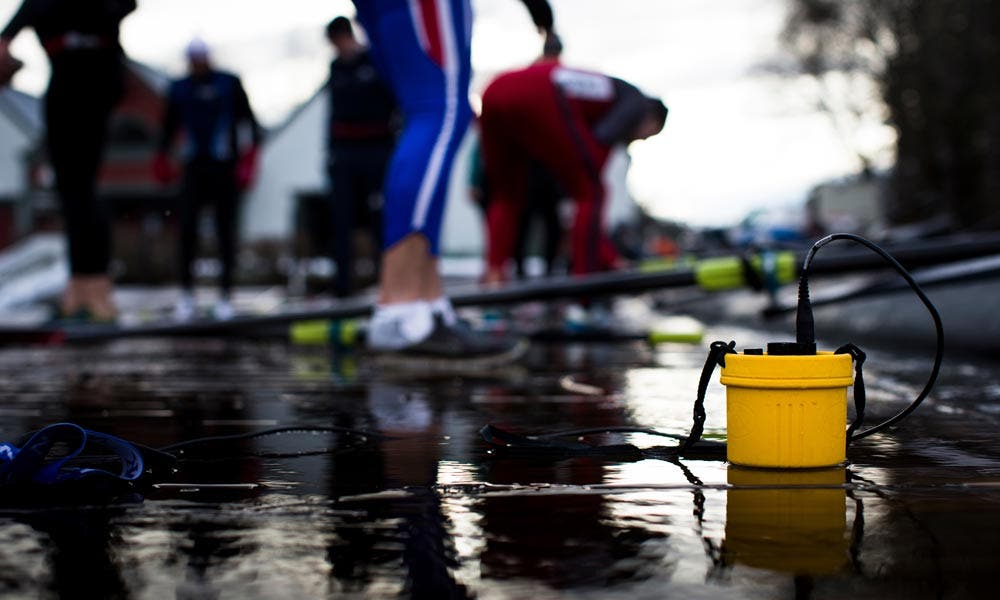Why Not Me – Becoming an Olympic Coxswain

Insights and tips to become an Olympic coxswain, featuring Kristen Kit, gold medal coxswain for Canada’s women’s eight Tokyo 2020.
It is a hard road to become an Olympic rower. Even harder to become an Olympic coxswain. Just do the math. As a sweep rower you might be selected for the eight, the four or the pair, while scullers have the potential to race the single, double or quad. The eight is the only coxed boat at the Olympics and there is just one ninth seat in the women’s boat and one in the men's boat. In the Paralympics, the only boat class with a coxswain is the mixed coxed four. A grand total of three seats.
Kristen Kit coxed the Canadian women's eight to Olympic gold in Tokyo in July 2021. She has a bronze medal from the 2016 Rio Paralympics plus medals from World Rowing Championships and World Cups since she began coxing for the Canadians in 2009. Her road to Olympic glory has not been an easy nor a direct one.
I’m just an average kid from St. Catharines, I didn’t have a huge sporting family growing up, and it was really a question of me seeing what’s available. Even though it was a 1% chance, I asked myself, "Why not me?"
--Kristen Kit
By telling her story, Kristen hopes to have more young athletes ask the same question – why not me? "I've already had coxswains reach out to me saying that they saw the race, and they are now inspired to pursue the higher level of competition, and that's amazing," Kristen shared in an interview with her home club one week after wining the gold medal. "I'd love to use my experiences to help other coxswains. I mentor coxswains now, and it's great…It's hard as a coxswain if you don’t have a model, so I'm happy to pay it forward."
Overcoming barriers
"There is no straight path to becoming a great coxswain; it is part of the beauty and the challenge of the seat. "
--Kendall Schmit, USA National Team Coxswain
Coxswains, and especially Olympic coxswains, need to know and do a lot. Great coxswains become students of the sport, mastering more than safety, steering and calls. "Once a coxswain tackles the topic of coxing, she can turn her focus to rigging, coaching styles, rowing styles, new equipment, and emerging technology." writes Marcus McElhenney, US Olympic coxswain in a post on how to become a national team coxswain. Kristen, who has been coached by Marcus, concurs. "Coxing is not black magic", she shared in a recent interview. "It's about working with the information that you have to the best of your abilities."
Time is another constraint. Training often must be squeezed in with education or jobs. British Olympic coxswain Adrian Ellison racked up 1,000 miles a month, commuting twice daily to Henley-on-Thames from his home and workplace in East London. Coxswains not only participate in the crew's workouts, but often have their own training regimen to squeeze in. Henry Fieldman, who has won World Rowing gold medals for the British coxed pair and bronze for the British men's eight, believes that being fit helps him physically in the coxswain's seat. For Kristen, competitive cycling improves her focus and ability to make split-second decisions. She better appreciates what her team feels during a race, which helps her with strategy and motivation.
Access to equipment is another barrier. The annual NK Grant Program supports communities and athletes with grants towards NK equipment. It is one way that the company gives back. Kristen was a grant recipient in 2019. It started at the San Diego Crew Classic, where Kristen was coxing the North Dakota Indoor Rowing Team, an eclectic crew of athletes from across the USA and Canada. After her race, her CoxBox was stolen. The deadline for the NK Grant Program was later that month, so she applied, requesting a new CoxBox Rowing Performance System instead of the SpeedCoach offered to athletes.
I feel grateful for the CoxBox— it has served us at our World Cups and World Champs last year! I love that the colour is sharp and different, and the integration of the GPS and CoxBox function.
The Canadian women's eight team helped her select the unusual watermelon colors of pink and bright green. That same CoxBox was in the gold medal winning boat in Tokyo in July.
There may be setbacks
Aspiring national team coxswains can find guidance and inspiration from Olympians who have had an indirect path to success. Competition is fierce and more than one coxswain has made it to the top level, only to be dropped from the national team. Katelin (Snyder) Guregian took two years off after having been cut from the US women’s eight. She returned to win gold at the Rio Olympics in 2016 and feels that she would not have appreciated the sacrifice and work required if she had always succeeded.
Adrian Ellison says that it takes years to earn respect, but you can lose it with one bad race decision. Marcus McElhenney understands. A panicked call which changed the race strategy at the 2005 World Championships in Japan dogged him through to being narrowly selected for the 2008 Beijing Olympics.
In facing setbacks during her coxing career, Kristen found that there always is a way and an answer to the question "Why not me?" She learned how to advocate for herself and to find the chances to gain experience and show what she is capable of. She was devastated in October 2013 to learn that she was being replaced, despite having won a bronze medal with the Canadian women’s eight at the World Championships. In 2014, Kristen expanded her coxing experience at the California Rowing Club, a development club for collegiate rowers making the step from university rowing to Under-23 and Senior National Team competition. She earned an internship with World Rowing, spending the spring and summer working at international regattas where the Canadian team was competing. It paid off with her being selected for the para rowing mixed coxed four in 2015, ultimately winning bronze in Rio.
"There were a lot of reasons for me why I shouldn’t have been in that boat, why I shouldn’t have made the national team. You have to believe in your core, why not you? There’s a lot of failure, that doesn’t always need to be career ending, think about what you can learn from it and how can you adapt it to be part of your story."
-Kristen Kit referring to the gold medal Women’s eight Tokyo 2020Tips on becoming an Olympic coxswain
There is a lot to learn to become a good coxswain, whether at the club, school, collegiate or national level. Coxswain specific training is offered online or through camps – try Sparks or Rowing Academy. There are many resources online. Start with the NK Sports blog with posts Coaching Confident Coxswains and 7 Reasons Why Coxswains Should Learn How to Row. Coxpod offers regular podcasts on technical skills, interview and Q& A sessions, while Row2k.com has a regular feature In the Driver’s Seat interviewing coxswains of all levels including national team.
Kristen shared with NK Sports her top tips for coxswains:
Be curious. Every boat has its own personality, which you have to learn in order to elevate the rowers to get the best boat speed. Ask questions and listen. Stretch yourself with hard work, optimism and never-ending problem-solving.
Be an athlete in a different discipline. You don’t have to be the best, but you need to learn discipline and be willing to put yourself into the "pain cage' to know the emotions that your team will be feeling.
Be a rowing nerd. As a student of the sport, learn everything that you can. Study race results. Watch videos of regattas. Read interviews with athletes.
Know your equipment. Kristen thinks that the GPS on the CoxBox is an amazing tool. She is genuinely grateful that NK Sports continue to invest money and energy into innovation and product development. Regardless, you need to have a plan B if your equipment malfunctions. Know the speeds of your boat at different rates so that you can use time as a guide. It may sound basic, but you also need to know which button to push when under pressure during a race.
The Paris 2024 Olympics are barely two years away. Kristen Kit has set her sights on being selected for the Canadian women's eight. Younger coxswains are eyeing the 2028 Olympics in Los Angeles. Why not you?





